We wish to update community on important issues regarding COVID-19 and provide some legal resources and other supports. If you have any questions you can always call our office at 905-527-4572, or click on “apply for services”
For more Legal Information on legal issues and COVID-19 visit Steps to Justice
COVID-19 and Ontario’s Human Rights Code – Questions and Answers
Update on landlord and tenant law: Eviction suspension lifted and changes to eviction process
“Sheriff to enforce LTB Orders for Eviction as of August 1st, 2020.”
If you have received an eviction order prior to March 19, 2020 you should expect a written notice from the local Court Enforcement Officer (Sherriff) in the mail. If you do receive this document, please contact the Hamilton Community Legal Clinic immediately so that we can offer advice and assistance to determine whether the eviction can be stopped.
You can contact the Hamilton Community Legal Clinic by calling 905-527-4572, or by emailing hclc.cjch@gmail.com.
Background Information:
On March 19, 2020 the Superior Court of Justice issued an order whereby all residential evictions were suspended due to the state of emergency as a result of the COVID19 pandemic.
The Order stated that the eviction of residents from their homes, pursuant to eviction orders issued by the Landlord and Tenant Board (LTB) or writs of possession, were suspended until further notice.
On July 6, 2020, this Order was amended to say that the suspension of evictions pursuant to eviction orders from the LTB “are suspended until the end of the calendar month in which the state of emergency… is terminated.”
That state of emergency is scheduled to end on July 24th, 2020, which means that the enforcement of preexisting eviction orders that were issued by the LTB before the state of emergency was declared, can begin in the first week of August 2020.
The law that deals with most landlord and tenant disputes is the Residential Tenancies Act, 2006. If you live in subsidized housing (social housing) the Housing Services Act also applies to you. The law is very different for members of housing co-ops. It is called the Cooperative Corporations Act.
Tenants most frequently have problems with their landlord if they have not paid their rent on time or have caused some damage or a disturbance. This is when the landlord tries to evict the tenant. Tenants often need to get repairs done to their apartment and are not sure how to go about it.
Our Clinic offers information, advice and representation to low income tenants. If you are having a problem with your rental unit or your landlord, we can help explain your rights and obligations under the law. We can also advise you when to get help from another service and how to take legal action to deal with your issue. In some cases we will represent you. There are many resources available in Hamilton to help you.
Urgent action must be taken by the province to provide rent relief to renters impacted by this pandemic.
Apply for CERB (Canada Emergency Response Benefit) through Service Canada
COVID-19 Tenant: Know your rights: Download PDF
Advocacy letter for tenants regarding evictions: Download PDF
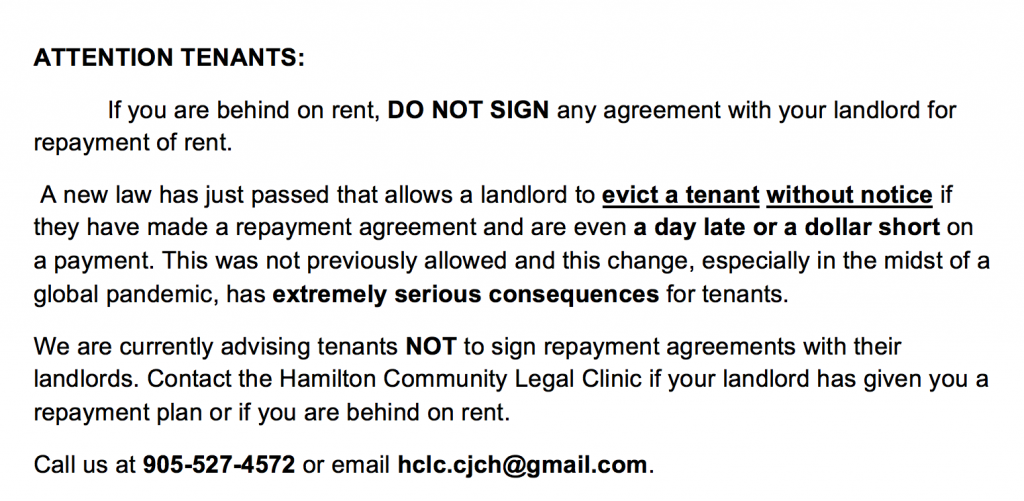
Your Tenant Rights: Air Conditioning Units (Download PDF)

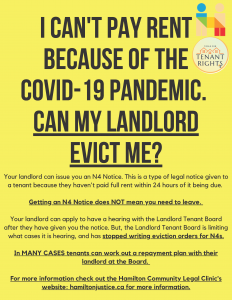
Arabic Download
Chinese Download
English Download
French Download
Punjabi Download
Somali Download
Spanish Download
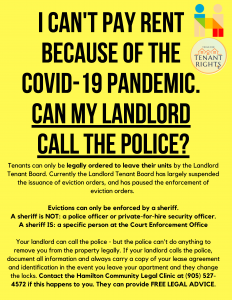
Arabic Download
Chinese Download
English Download
French Download
Punjabi Download
Somali Download
Spanish Download
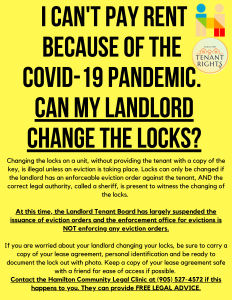
Arabic Download
Chinese Download
English Download
French Download
Punjabi Download
Somali Download
Disclaimer: This is general information only. It is NOT legal advice. Please call us or a lawyer in your area for advice on your particular situation.
“You have the right to a safe workplace”
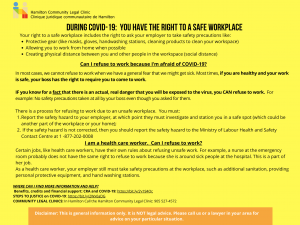
“Self-isolating during COVID-19”

“I was laid off from my job because of COVID-19- What are my rights?”
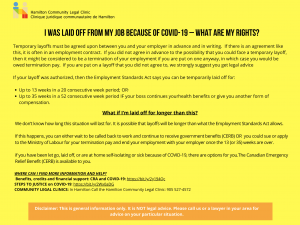
CERB frequently asked questions
COVID: CERB ( Updated April 2, 2020)
Your rights at work: fact sheet
UPDATE: Service Canada has set up a SEPARATE phone line to contact them to set up EI claims for quarantine, illness, work closure, etc due to COVID-19. They will not help you with anything else at this number.
The number is 1-833-381-2725
In addition, they are waiving the 1 week waiting period for 2 week quarantines, so if a client is affected, please inform them to apply immediately.
Rudner Law Blog: https://www.rudnerlaw.ca/updates-on-covid-19/
Doorey Law of Work: http://lawofwork.ca/covid-19-layoffs-and-employment-standards-an-introduction/and http://lawofwork.ca/constructive-dismissal-in-the-time-of-covid-19/
Progressive Barristers: https://www.progressive.law/news/covid-19-and-your-rights-at-work
Samfiru Tumarkin: https://stlawyers.ca/blog-news/covid-19-employment-rights-everything-you-need-to-know/
Service Canada EI Notice on Coronavirus: https://www.canada.ca/en/employment-social-development/corporate/notices/coronavirus.html
Ontario Government Expanding Funding for Children, Youth and Students – Updated Jan 2021
COVID-19 Information City of Hamilton
Accessing income support in wake of covid-19
“OW and ODSP Emergency Benefit”
“Canada’s Emergency Response Benefit”
“Canada Emergency Student Benefit”
24-Hour Crisis Line: 905-529-7878
Toll Free: 1-844-777-3571
905-972-8338
Toll Free: 1-844-972-8338
coasthamilton.ca
289-804-2343
Call or text seven days a week (Tuesdays are text-only)
between 6 p.m. – 9 p.m.
1-800-668-6868 (or text HOME to 686868)
Good2Talk (for college and university students)
1-866-925-5454
CLEO Resource: Abuse and Family Violence
Emergency family law referral telephone line
The Law Society of Ontario, with support from the Superior Court of Justice and the Ontario Court of Justice, has launched an interim emergency family law referral telephone line to provide assistance to people who are self-represented (SRLs) and are trying to determine whether or not their family court matter meets the criteria to be heard by the Court on an “urgent” basis and, if so, how to proceed in making their request.
SRLs may contact the Law Society about this service by phone during business hours:
Toll-free: 1-800-268-7568
General: 416-947-3310
This emergency service will connect SRLs with family lawyers, working on a pro bono basis, who will provide 30 minutes of legal advice to determine whether or not their family court matter is urgent, as well as referrals to other available legal services.
Additional services may be available from the lawyer on a private retainer basis from Legal Aid Ontario, the Law Society Referral Service or the private unbundled family law roster.
This interim measure is offered by the Law Society in association with the Ontario Bar Association and Toronto’s Family Law Advice and Settlement Counsel project, with support from the Family Lawyers Association and the Federation of Ontario Law Associations.